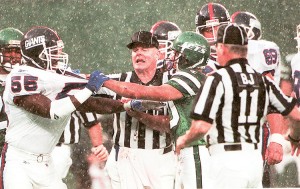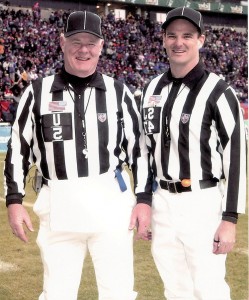By Art Petrosemolo
The Carolina Panthers and the Denver Broncos will face off Sunday in California for historic Super Bowl 50. Thousands of fans will spend upwards of $1,600 – or more on the secondary market – for a game ticket while millions will watch from the comfort of their couches here in the U.S. and around the world.
Although some viewers hope for a blowout, others want a game as exciting as Arizona’s overtime victory over Green Bay in the divisional round. But for the NFL’s seven on-field officials, a well-played, clean hitting game from both teams is their hope. So says Jim Quirk of Rumson, a retired, 21-year veteran NFL umpire now the executive director of the League’s Referee Association.
“Being selected to officiate a post-season game is an honor,” said Quirk, “and being selected and working a Super Bowl is a lifetime memory.” Quirk, who is 75 years old, knows. He umpired the 1998 Super Bowl in San Diego when John Elway’s Broncos defeated Brett Favre and the defending Super Bowl Champion Green Bay Packers 31-24.
When asked if it is difficult to officiate a Super Bowl, Quirk laughs. “It is probably one of the easiest games of the year,” he said. “You have the two best teams, well prepared, playing with a minimum of penalties and very little chance of fighting. All that these teams are there for is to play well and win the game!”
Clete Blakeman – an alternate official in the 2014 Super Bowl – will serve as the referee and crew chief for the 50th Super Bowl. He has been an NFL official since 2008 and a Referee since 2010.

In recent years, the NFL picked their post-season officials by group, taking the top crews of on-field officials who had graded well, assigning them one of the 11 Wild Card, Divisional, Championship games or the Super Bowl. Quirk explained that today, under the current Referee’s Association agreement with the league, any of the 122 officials, who has graded well throughout the season, can be put together in a crew for a post-season game. The association currently includes one woman – line judge Sarah Thomas – who works a full slate of 15 games in referee Pete Morelli’s crew. Quirk said there certainly will be more women officials in the future.
To be an NFL official can take years as men and women gain experience working age-group, high school, and college games before applying to the league for evaluation. “Prospective officials are tested, given training and then work training camps and preseason games before they are ready for regular season games,” said Quirk. “Then they have to wait for an opening in the ranks.” Quirk said there were 23 new officials in the league the last two years, but maybe only one or two openings for the 2016 season.
Officials become eligible to work a playoff game after one year of service and a Super Bowl game after five. However, in reality, most playoff officials have many more years of seniority and experience, having officiated hundreds of NFL games.
Technology has made a huge difference in how an NFL official or, for that matter, officials in any professional sport, do their job. When instant replay was only in its second year, Quirk was involved in a call in a game that would later be remembered as the “Instant Replay Game.”
It was 1989 and late in the Chicago Bears at Green Bay Packers game. At the time, the NFL rule stated that only the ball, not the body, had to be behind the line of scrimmage when a quarterback was throwing. Quirk called a pass by Green Bay quarterback Don Majkowski incomplete, as he was over the line of scrimmage. The referee reviewed the replay – then on slow videotape – and the pass was ruled complete and a touchdown with the Packers winning 14-13. The call and review seemed to be a catalyst for acceptance of instant replay for close calls in future years.
“In the beginning, a network might work a regular season game with eight cameras,” Quirk said, “and the referee (then and now) has just 90 seconds to review the replay before making a call.” Today, Quirk explained, there can be 25-30 cameras at a regular season game and even more for the playoffs and Super Bowl making every angle available not only for the official to see but the NFL replay official in New York City to watch, as well as the stadium crowd – on large video screens – and millions of fans across the country.
“The officials get it right on-the-field almost all the time,” Quirk said, “but this is a game played by big men in superb condition moving at lightning speed. It is almost impossible, with or without instant replay, to have a perfectly officiated game but that’s what the NFL is shooting for.”
Complicating matters is social media. “Everyone is an expert today,” Quirk said. “Fans see a replay, make a decision and then thousands Tweet their opinion.” Holding the NFL current rules book, with more than 100 pages of rules and case studies, Quirk smiles and said, “Just being sure you know all the rules and then to execute them correctly in the fast-paced atmosphere of an NFL game can be daunting.”
What it adds up to is even though an NFL official can have years of experience, know the rules cold, undergo ongoing training and be as prepared as anyone to make the close call in a tight game with the Super Bowl championship on the line, a fan in Omaha, watching at his local watering hole, will swear he made the incorrect call. “Not much you can do,” Quirk said.
The retired official says one thing the NFL and owners have to address – which they are doing now – is what constitutes a completed pass. “The words controlling the catch, making a football move, et cetera, leave a lot to on-field interpretation and make it harder and harder to make the right call without instant replay,” Quirk said, “and we need to simplify that.” The officials have always welcomed instant replay but no one wants every close play reviewed, Quirk said. “It is a fast played, at times, imperfect game, and trying to officiate it perfectly just won’t happen or you’ll lose the spirit of the game.”
So on Feb. 7, as you settle down to watch Super Bowl 50, besides cheering for your favorite team, give some love and respect to the seven on-field officials, the five alternates and the instant replay officials at the field and in the NFL’s New York City office. Just hope that all goes smoothly and that the game is decided on-the-field by the players and not by a judgment call or by the referee – with his head under the replay hood – making a critical call in 90 seconds after watching multiple replays to try and get it right.
Like Father, Like Son

Jim Quirk isn’t the only member of the family to have roamed the sidelines of National Football League games.
Jim and Carol Quirk’s son James C. Quirk has been an NFL official for six years.
James works as a back judge and has his eye on becoming a referee as he qualifies and a slot becomes available.
Quirk played high school football at Red Bank Catholic and at Middlebury College in Vermont.
In his six years in the league, he has worked a number of playoff games, including the 2012 New York Giants – Green Bay Packers game in Green Bay, Wisconsin, that the Giants won 37-20 on their way to the NFL Championship game and an eventual Super Bowl victory over the New England Patriots.
Quirk is a certified financial planner and lives in Middletown with his wife and three daughters.














